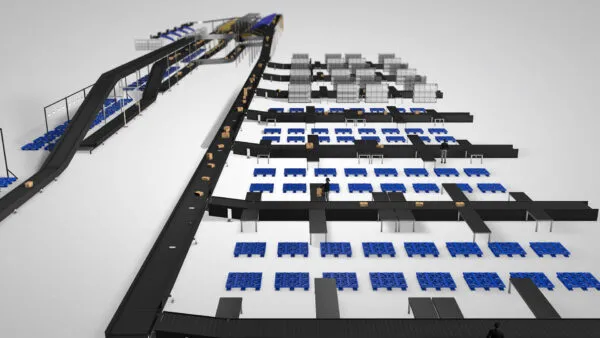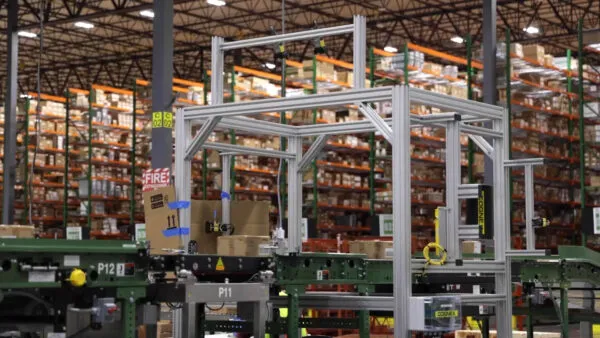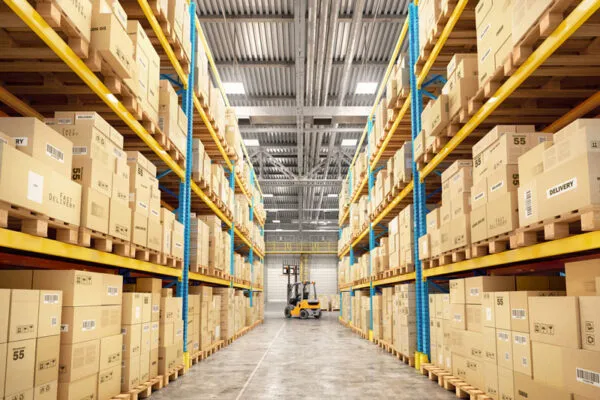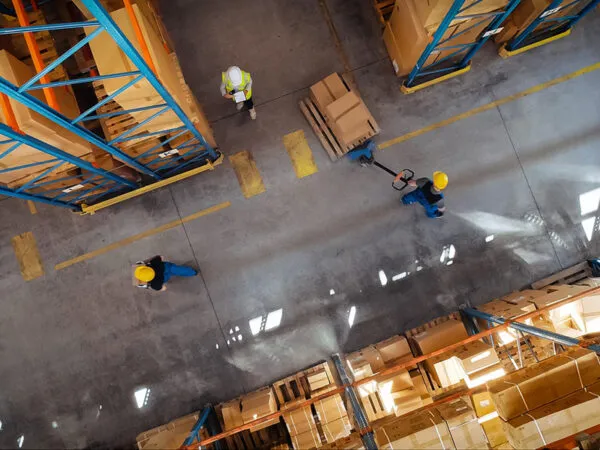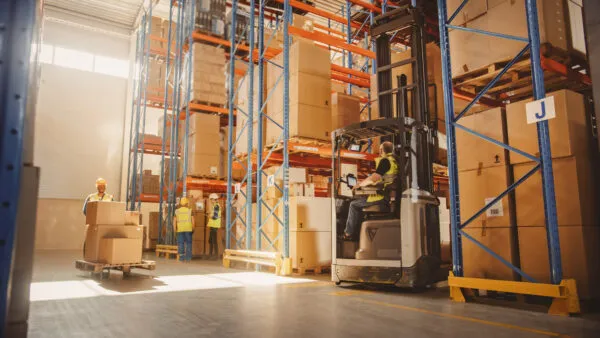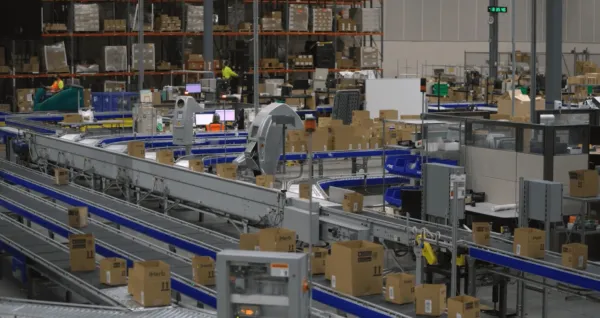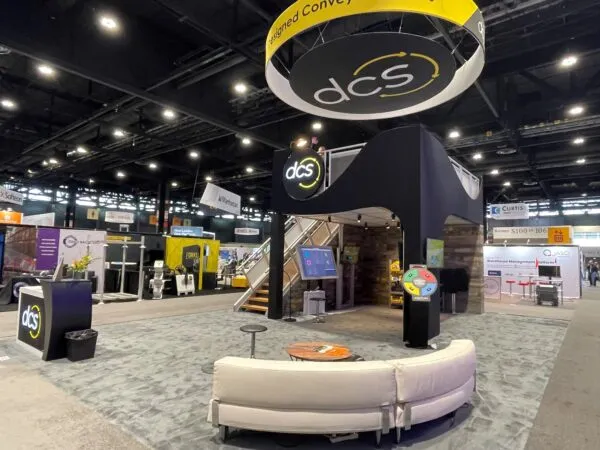This site is protected by reCAPTCHA and the Google Privacy Policy and Terms of Service apply.
4 Ways DCS is Helping Customers Conquer Current Supply Chain Challenges

The supply chain landscape is continuously evolving. Whether we’re in the “new normal” or truly are “post-pandemic” remains to be seen. Regardless, DCS’ customers continue to grapple with a variety of supply chain industry challenges as they strive to meet their own customers’ expectations.
Whether they’re in distribution, e-commerce or multi-channel fulfillment, or parcel handling, each customer’s unique situation is complex and multi-faceted. However, there are four top supply chain challenges that customers are perpetually engaging DCS to help them conquer. They are:
- Ongoing labor shortages
- Cost justifying automation investments
- Continued supply chain disruptions
- Extended lead times
Over the past 24 months, DCS has devised and leveraged multiple creative strategies to help our customers attain solutions to these four key supply chain industry challenges. Here, I’ll walk through our partnership-driven approach to meeting our customers’ needs.
Applying Automation to Address Ongoing Labor Shortages
Labor shortages continue to affect virtually every industry, and operations within supply chains are not immune. The workforce that retired during the pandemic is gone. The industry, despite its increasing transition away from manual labor, is still struggling to attract workers.
Unfortunately, the labor situation doesn’t appear likely to improve anytime soon. According to an article by the Society for Human Resource Management, economists anticipate current labor shortages to continue for the foreseeable future, as our population continues to age. Meanwhile, end consumers’ demand for e-commerce and faster receipt of their online orders has led to unprecedented growth in warehouse construction. With fewer available workers to staff either existing or new operations, companies are increasingly turning to automation to mitigate that shortage and its impact on service levels.
DCS is working with customers to find ways to successfully automate their operations, not to replace existing workers, but rather to make their jobs easier and less physically strenuous. Together, we’re applying automated solutions that increase productivity without increasing headcount. From simple updates to existing operations to highly complex greenfield facility designs, DCS creates optimized solutions that meet their goals.
To help customers address the ongoing shortage of available labor, DCS develops custom engineered systems built from a mix of brand-agnostic, automated material handling solutions. These include flexible, scalable equipment such as: autonomous mobile robots (AMRs), automatic guided vehicles (AGVs); automated storage and retrieval systems (ASRS), and goods-to-person (GTP) solutions; traditional automation including conveyors and sortation; warehouse execution system (WES) software; and other integrated solutions.
Creative Financing Approaches Help Automation Investment Budgets
In many of the projects we work on, companies would prefer to add more staffers. But those with facilities in areas where it’s become exceptionally challenging to attract, hire, and retain a consistent, reliable workforce, automation has become their only alternative. Even in geographic regions where the return on investment (ROI) in automation is challenging to justify, from a business continuity and competitiveness point of view, it’s become a necessity.
Just because a company must invest in automation doesn’t necessarily mean they have the available capital to acquire it, however. Historically, organizations might turn to venture capital, exchanging equity or shares for funding to underwrite automation investments. These days, the venture capital market has cooled, and companies — both publicly and privately held — are disinclined to sign over part of their business. Simultaneously, with the uncertain economy, companies have been reluctant to commit to major capital expenditures.
To help our customers obtain the automated solutions they need, DCS has developed partnerships with real estate brokers who specialize in industrial properties. As part of lease terms, these brokers build in the purchase and deployment of the necessary automation. In exchange, the tenant company pays a higher lease rate. This strategy allows them to finance what would be a capital expense as an operational expense instead.
This is just one example of how DCS is creatively leveraging its partnership network to help our customers with warehouse automation challenges. Relationships with our partners enable us to provide significant value beyond our ability to design, engineer, source, install, and commission an automated system.
Forecasting and Capacity Analysis Offset Unpredictability
Amid continued supply chain disruptions and port congestion, many companies are struggling to ensure adequate inventory availability. Many are moving away from the “just-in-time” approach to goods receiving and instead looking to increase their safety stock volumes. Simultaneously, companies don’t wish to be overburdened with costly dead inventory.
To help our customers determine the optimal volume of products they need to satisfy their customers’ expectations, DCS’ Supply Chain Consulting Services team offers comprehensive data analysis. They develop forecasting models that analyze demand and perform network analysis to determine the best geographic location to stock each item. Taken together, these predictions can minimize carrying costs and delivery times.
DCS’ forecasting also aids customers in determining the appropriate amount of warehousing space needed to store extra inventory during both regular and peak demand periods. Demand forecasting helps DCS’ customers right-size their operations and storage capacity to accommodate this buffer. This might mean expanding a current facility’s footprint or leveraging its existing cube with vertical storage solutions to enhance overall capacity. Either way, DCS helps customers ensure they can cope successfully with variable supply and demand and not negatively impact their customers’ experience.
Partnerships and Phased Schedules Overcome Long Automation Lead Times
In the years before COVID, it was possible to get a new automated material handling system up and running within three to four months. Now? At least 12 months — thanks to extremely long lead times driven largely by microchip shortages. The chip shortage is unlikely to end anytime soon, as global production has not been able to keep up with rising demand. Further, it will take a few years to complete the new U.S. factories being built to produce these vital components.
As part of our approach to combating warehouse automation challenges and long lead times, DCS maintains long-standing partnerships with original equipment manufacturers (OEMs) and vendors. Because of those relationships, DCS is able to collaborate with our partners to pre-order equipment and components, reducing overall project duration.
Additionally, we’ve implemented a variety of creative strategies to tackle freight and logistics issues that can also negatively impact a project’s schedule. These include offering our own warehousing and storage facilities to house key components and equipment as they become available. We can even use this space to reduce acquisition costs by purchasing and storing units on behalf of our customers ahead of annual price increases.
Further, to address unexpected project delays due to disruptions associated with weather events (such as hurricanes, wildfires, floods, or blizzards) or potential resurgences of COVID-19, we work with our customers to build in small buffers throughout their project deployment schedule. This ensures more realistic timelines. We also utilize detailed communication protocols to stay in constant dialog with our customers about issues as they arise and how we plan to adapt in order to keep their project on track.
Finally, DCS approaches project installations and deployments pragmatically. Rather than attempting to open a completed facility in its entirety on a single go-live date, we’ve begun planning for multiple, phased go-lives. This allows companies to begin taking advantage of their new system as different elements come online. Our project management team looks at the entire project and works to schedule deployments in a way that enables customers to take advantage of their new equipment in a timelier fashion.
For example, we’ll focus installation efforts on the inbound sorter first. This allows an operation to train its people on how to use and maintain the new equipment while they simultaneously bring in product to fill up the building. It also facilitates debugging and generates buy-in from staffers, which eases the overall change management process.
While workers become more familiar with the inbound sorter, we continue to install and deploy additional equipment to populate the process through to outbound shipping. Simultaneously we work to integrate the overarching control software. By utilizing a step-by-step installation approach, customers can begin leveraging their new system sooner than later.
Looking for a customer-focused systems integrator to help you conquer your supply chain challenges? Connect with us to learn more about how partnering with DCS can get you there.
